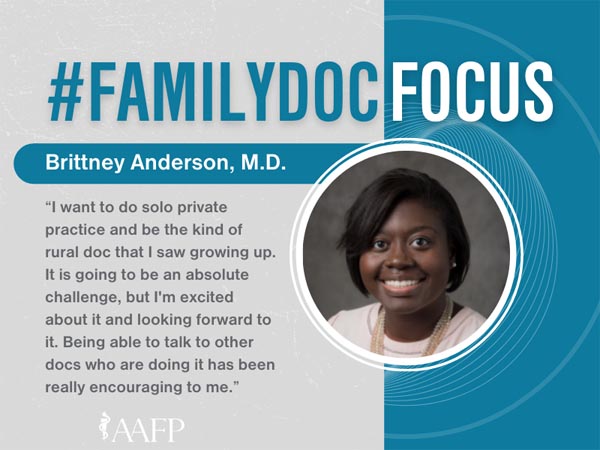Rural Doc Working to Expand Access to Care
February 14, 2022, 11:06 a.m. David Mitchell — During a summer abroad in Ghana, Brittney Anderson, M.D., witnessed people who had traveled great distances for health care. When the undergraduate returned home to Alabama, she told her father about the great need for physicians in the West African nation.

“He said that although it was certainly noble to want to travel abroad to do that work, I should not forget that there were folks nearby — our family members included — who also had to travel long distances for care,” Anderson said. “That really sparked my interest in rural medicine and the disparities related to access that people in our state face.”
After graduating from Duke University with a psychology degree, Anderson was accepted into the University of Alabama’s Rural Medical Scholars Program. The program, which leads to a master’s degree in rural community health, assists college students from rural areas who want to become physicians and practice in the state’s rural communities. Students complete pre-matriculation courses at the University of Alabama related to rural health and primary care and participate in seminars, field trips and community service programs. The majority of the program’s graduates are primary care physicians. In 2018, 62 of Alabama’s 67 counties had primary care shortages.
“The rural medical scholars program really settled it for me, that this was my passion,” said Anderson, who grew up on an 80-acre farm near Prattville that her family has owned for generations. “I was able to go on trips and speak with farmers and folks who reminded me of grandpa and my great-granddad about their health care experiences and the need for access and the need to have a doctor closer to town. I identified with the people that I met, and that’s the beauty of the program. You are getting these students who will identify with these communities and are more likely to return to such a community to practice.”
Since 2019, Anderson has practiced at the University Medical Center in Demopolis while also serving as an assistant professor in the University of Alabama College of Community Health Sciences’ Department of Family, Internal and Rural Medicine. That will end this spring when Anderson steps away from her academic role with plans to open a private, solo family medicine practice in Demopolis this summer.
Anderson knows she is bucking a trend at a time when the majority of U.S. family physicians are employed. She said she talked to practice owners across the state and country, including colleagues in the AAFP’s member interest group for independent solo and small-practice physicians, before making her decision.
“I want to do solo private practice and be the kind of rural doc that I saw growing up,” she said. “It is going to be an absolute challenge, but I’m excited about it and looking forward to it. Being able to talk to other docs who I know and respect who are doing it has been really encouraging to me.”
Anderson, who was one of the AAFP’s Healthy Equity Fellows in 2021 and is a member of her state medical association’s Rural Physician Shortage Taskforce, said she still plans to be involved in mentoring.
Anderson and other health care professionals in the congregation at the Elizabeth Baptist Church in Tuscaloosa created the Bright Futures Health Interest Group in 2019. The initiative gathers minority students from elementary school to the college level together once a month (via Zoom during the pandemic) to hear from local Black health care professionals about what they do and what type of education and training is needed for similar careers.
Fourteen percent of Americans are Black, but only 5% of U.S. physicians are Black.
“That's a number, when you think about patient-physician racial concordance and trust, that we’ve got to change,” she said. “We’re trying to put health professionals from various fields in front of these students who look like them and say, ‘Hey, I’m doing this, and you can do it, too.’ That experience has been really great.”
Anderson also is reaching out to Black college students interested in medical careers through a blog, Melanin Mentor, MD, that she launched last year.
“I talk about some of my experiences like getting through the MCAT, dealing with course load and how to be a successful applicant,” she said. “I write it as if I’m their older sister or their auntie who’s giving them advice about being premed. I’ve gotten feedback from students all across the country who read the blog, and it really touches my heart because I wish that I had something similar to that when I was a first-generation, Black pre-med student.”